Start Your Free Trial!
Sign up to our newsletter, stay updated on news and exclusive offers from EaseUS. Don't worry, if you change your mind, you can unsubscribe at any time, free of charge. We value your privacy (Privacy Policy).
Page Table of Contents
Why the Update Is Not Applicable to Your Computer
How to Fix The Update Not Applicable to Your Computer
To Wrap Things Up
FAQs on This Update Is Not Applicable to Your Computer
If you are trying to install an update on your Windows, but facing the "the update is not applicable to your computer" error, we have go-to solutions for you. This article from EaseUS explains the potential reasons for Windows updates failing on your PC and details the working solutions to fix the "update not applicable to your computer" issues on Windows 10/8/7.
Updates are integral to the Windows OS. Microsoft rolls out constant updates to help Windows perform at its best and provide security against threats. Windows updates start with KB (Knowledge Base), and Microsoft ships them to users to keep up with current trends and security standards.
However, sometimes, users face the "the update is not applicable to your computer" error message. While this is a common phenomenon for KB updates like KB2999226, KB3033929, KB4012212, etc., on Windows 7/8/10, you may also face such issues on Windows Server 2008 R2 and Windows Server 2016.
What causes the error? Here are some common reasons:
If your Windows PC shows that the update is not applicable to your computer error, here are some solutions you can try to fix it.
The Updates need specific Windows system requirements to install the files. If you update it incompatible with the system and architecture, the update fails to install. So, check if all the system download requirements are met before installing new updates. Let us see how to check the Windows system requirements for updates.
First, we must find the system requirements of the update we aim to download. Go to the Update settings page, find the update number (it starts with KB********), and copy it. Go to the Microsoft Update Catalog and search for the updated details. Here, you can find the details of the system and compatible processor.
Step 1. Open the Windows 11/10/8/7 PC, and navigate to This PC or Settings.
Step 2. Find the system settings and open them to see the Windows architecture and system type.

You cannot update your computer if it runs a 64-bit Operating System and x64-based processor; the update compatibility is x86-based Windows.
Share this article on social media to help others solve the Windows update is not applicable to your computer error!
What if the update is compatible with your Windows, and you still face the "the update does not apply to your computer" error? The update may have already been installed. You may need to open the Update history to check the details.
On Windows 7, open Control Panel and go to Windows Update > View Upgrade History. On Windows 10, go to Settings > System & Security > Windows Update > Update History. Match the update codes and check if any updates have already been installed.
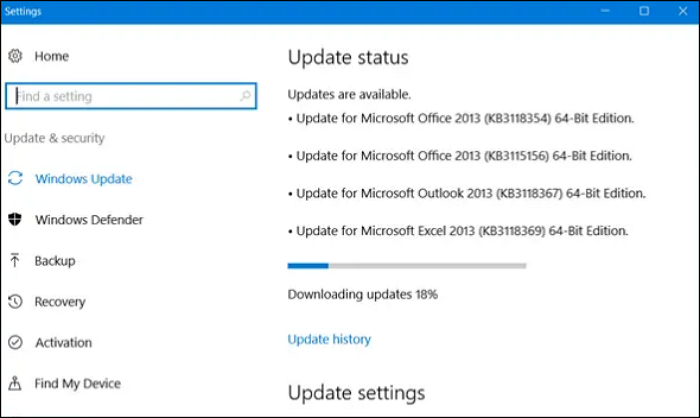
As per Microsoft, some Windows Updates are co-related and require installation prerequisites before downloading further updates.
For example, the prerequisite updates for update errors on Windows 8.1 or Windows Server 2012 R2 are the April 2014 update KB 2919355 and one of the servicing stack updates (KB 2919442 and KB 3173424). But how do you check for such co-related updates?
Windows lets you find co-related updates with PowerShell or CMD. Enter the command below with the problematic Windows Update code to find the details.
get-hotfix WindowsUpdateCode
If you have problems with Windows Updates, you can run the Windows Update Troubleshooter to find and fix the issue. Let's see how to find Windows Update Troubleshooter on Windows 10 and run it:
Step 1. You can navigate to Settings > System & security > Troubleshoot.
Step 2. Find the Windows Update in the Getup and Running section and click on Run the Troubleshooter to start the function.
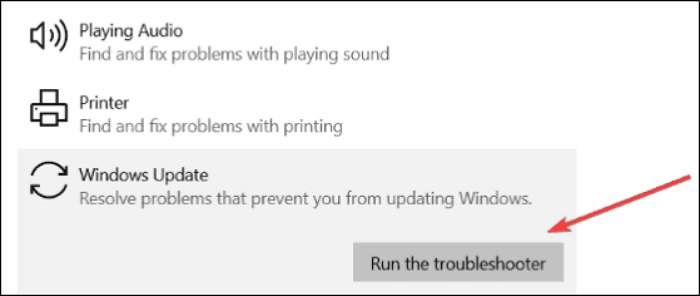
Step 3. Once the function starts, wait for it to find the errors, then click Apply Repairs automatically to correct them.
If the recent KB update has yet to be installed on your PC, you can try installing it to fix the update that is not applicable to the PC error.
Stage 1. Back up Files Before Windows Update
Installing KB updates or update errors on Windows may cause data loss. EaseUS Todo Backup provides complete system protection with backup options to avoid data threats.
Secure Download
To safeguard important files on the PC, you can create backups, generate system images, and back up files to the cloud. Get the EaseUS free backup software for Windows now and protect your data.
Step 1. Launch EaseUS Todo Backup on your computer, and click Create Backup on the home screen and then hit the big question mark to select backup contents.

Step 2. To back up your Windows operating system, click "OS" to begin the backup task.

Step 3. Your Windows operating system information and all system related files and partitions will be automatically selected so you don't need to do any manual selection at this step. Next, you'll need to choose a location to save the system image backup by clicking the illustrated area.

Step 4. The backup location can be another local drive on your computer, an external hard drive, network, cloud or NAS. Generally, we recommend you use an external physical drive or cloud to preserve the system backup files.

Step 5. Customiztion settings like enabling an automatic backup schedule in daily, weekly, monthly, or upon an event, and making a differential and incremental backup are available in the Options button if you're interested. Click "Backup Now", and the Windows system backup process will begin. The completed backup task will display on the left side in a card style.

Stage 2. Download & Install the Latest KB Update
Step 1. First, you should find the recent KB updates for the Windows version. Go to Windows 10 and the Windows Server update history page and find the list of Windows 10 KB updates. Find the recent KB update and copy the update code.
Step 2. Go to the Microsoft Update Catalog page and search for the update using the code.
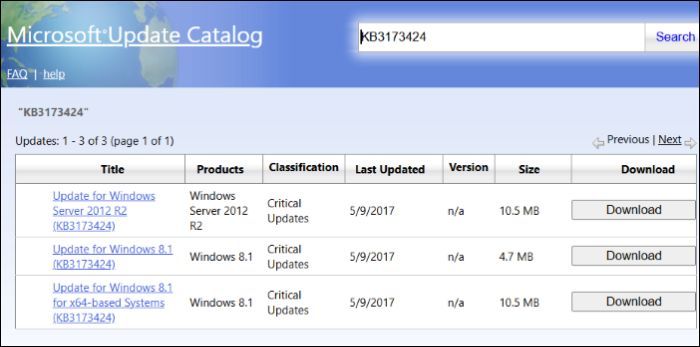
Step 3. Choose the compatible KB update and download it on Windows. After downloading, you can try installing the latest updates.
DISM and SFC scans help you examine system files and fix errors, such as troubleshooters. They dive deep into Windows files, including the function responsible for updates and fixing related issues.
Step 1. Open CMD with admin rights.
Step 2. Execute the below command:
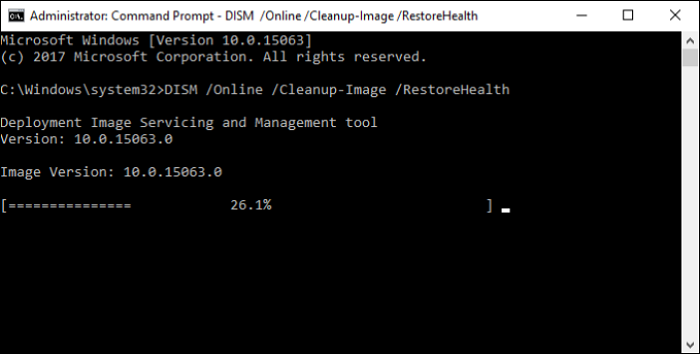
Note: DISM is unavailable for Windows 7, so use SFC scans.
Step 3. Now, type sfc/scannow and execute. Once done, restart the PC and try installing updates again.
Some users could fix the "This update is not applicable to your computer" error by changing the system locale to English. Let us see if you can fix Windows update errors by setting Locale to English.
Step 1. Open the Control Panel and go to Region and Language (Windows 7) or Lock, Language, and Region (Windows 10).
Step 2. Open the Region window and set the format to English (United States) under Formats.

Step 3. Navigate to Adminstrative > Change system locale and set the Current Locale to English (United States).
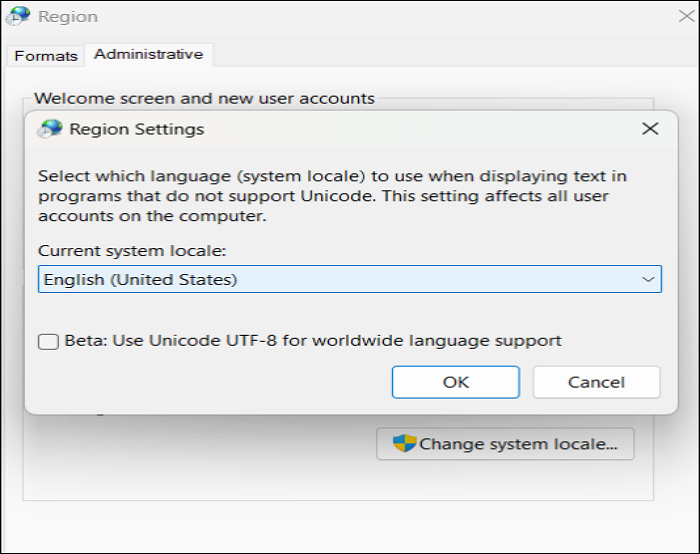
Step 4. Now, retry installing the updates, and if successful, reset the System Locale to your desired choice.
If the "the update is not applicable to your computer Windows 10/8/7" issue still bothers you, you can perform a system restore using a restore point to revert to a previous working state. But you need a restore point on your PC to execute this step.
Step 1. Type create a restore point and open the System Properties.
Step 2. Under System Protection, click System Restore, and choose a previous restore point to start the restore process.
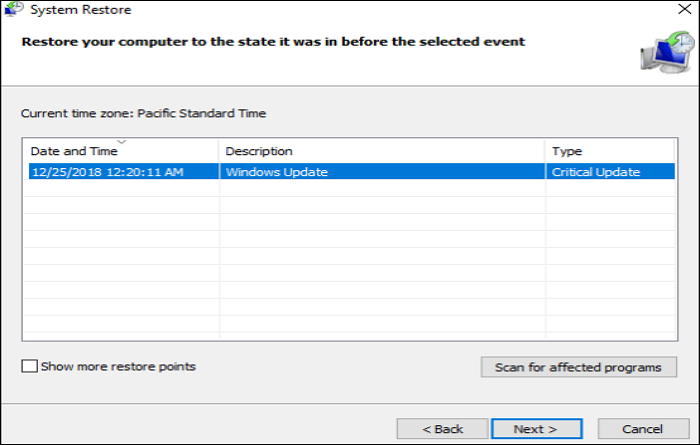
Share this article on social media to help others solve the Windows update is not applicable to your computer error!
Lastly, you can perform an in-place Windows Upgrade on your Windows to fix the can't install Windows update due to the "this update is not applicable to your computer" error.
Step 1. Get Microsoft's Windows Media Creation tool to install a fresh Windows copy or upgrade.
Step 2. Install and open the tool and choose Upgrade this PC now.
Step 3. Once the Windows setup is ready, select what to keep, along with the necessary preparation and Windows updates to upgrade the system.
Step 4. Choose to keep personal files, apps, and Windows settings and continue.
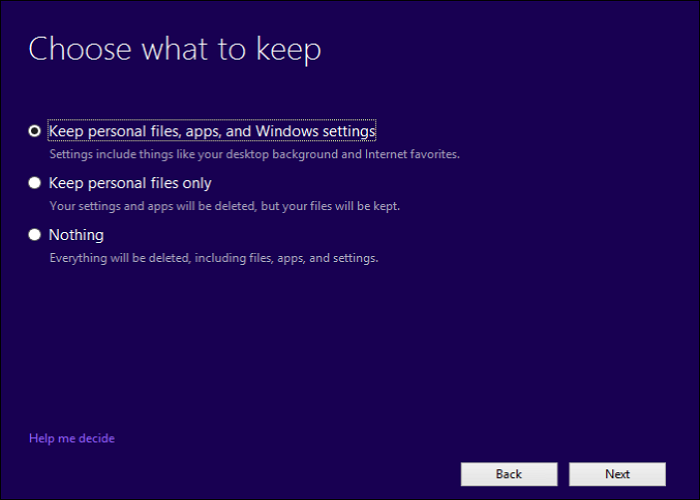
Step 5. Now, click Install and let the setup wizard handle the installation process.
If your Windows computer says, "The update is not applicable to your computer," it is worrisome as updates keep the Windows OS up-to-date and secure. The article helps you fix the problem on Windows 10/8/7 with 9 working solutions to keep your Windows safe and secure. But, if you are installing a KB update, system restore, or in-place upgrade, make a backup of the computer with EaseUS Todo Backup to avoid data loss and OS.
Secure Download
Here are some frequently asked questions when facing the "the update is not applicable to your computer" issue.
1. How do I manually install Windows Update KB?
Windows rolls out KB updates in the Update & security settings. Open Settings and navigate to the Update and Security section to manually install updates. Click on "check for updates" and download the latest updates.
2. Is it bad to not update your computer?
Yes, updates keep the computer up to date and decrease the risk of external threats, data breaches, performance issues, and compatibility issues.
3. How do I force a Windows Update to install?
First, try to install the Windows Updates via the Update settings. If that doesn't work, open CMD with admin rights and execute the wuauclt.exe /updatenow command to force updates.
Was this page helpful? Your support is truly important to us!

EaseUS Todo Backup
EaseUS Todo Backup is a dependable and professional data backup solution capable of backing up files, folders, drives, APP data and creating a system image. It also makes it easy to clone HDD/SSD, transfer the system to different hardware, and create bootable WinPE bootable disks.
Secure Download
Updated by
EaseUS Todo Backup

Smart backup tool for your files, disks, APPs and entire computer.
Topic Clusters






Interesting Topics
CHOOSE YOUR REGION
Start Your Free Trial!
Sign up to our newsletter, stay updated on news and exclusive offers from EaseUS. Don't worry, if you change your mind, you can unsubscribe at any time, free of charge. We value your privacy (Privacy Policy).
Start Your Free Trial!
Sign up to our newsletter, stay updated on news and exclusive offers from EaseUS. Don't worry, if you change your mind, you can unsubscribe at any time, free of charge. We value your privacy (Privacy Policy).